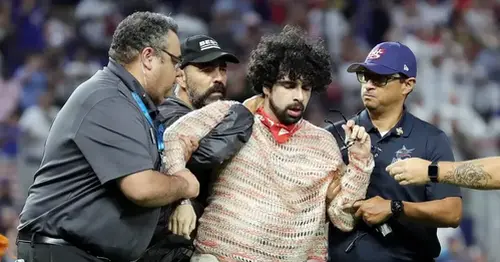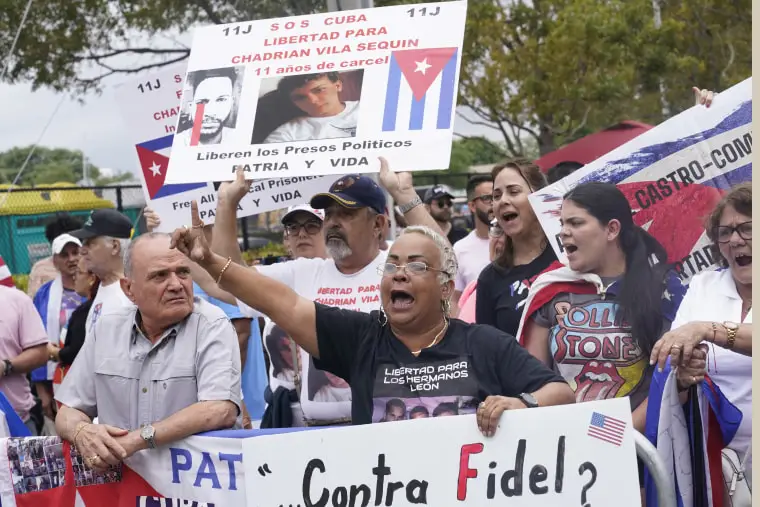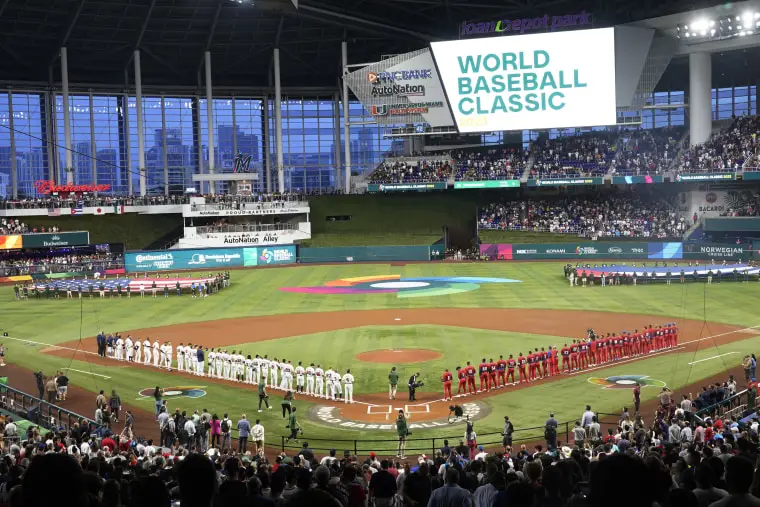
Protesters gather in Miami and run onto the field at Cuba-U.S. World Baseball Classic semifinal
MIAMI — A mix of protesters and fans gathered in Miami on Sunday as Team Cuba began its World Baseball Classic semifinal game against the United States.
Jose Vilela fled Cuba for the U.S. when he was 14 years old after spending six months in a concentration camp. Like many of his compatriots, he settled in Miami’s Cuban neighborhood, Little Havana.
Vilela, now 68, paced Sunday afternoon outside loanDepot Park, the Miami Marlins’ home stadium, where the Cuban national baseball team later lost to the United States 14-2 in the World Baseball Classic semifinals.
For prideful expats eager to separate sports from politics, the country’s first ever baseball game in Miami was cause for celebration.
But for Vilela and hundreds of others, it was reason to protest the political oppression they escaped.
Vilela stalked the stadium Sunday, yelling outside for anyone associated with the late Cuban leader Fidel Castro, who embraced Soviet-style communism, to leave the community. That included many Cuban players who are technically government employees.
“We don’t want them here,” Vilela said. “None. People that work for the Castro family. We don’t want them. They can go any place they want. Go to New York. Go to California. Not Miami. I hope this is the last time they come here.”
Three protestors were escorted out of the ballpark after running onto the field during the game.
In the sixth inning, a demonstrator waved a flag that said “Libertad Para Los Presos Cubanos Del 11 de Julio, which means “Freedom for the Cuban Prisoners of July 11” — referring to the day thousands of Cubans took to the streets in the island in 2021 to protest shortages of goods, power blackouts and economic hardship. Hundreds of people who participated are in prison. Saturday, the crowd erupted in “¡Libertad!” chants as that protestor exited the field.
All day, there had been a heavier police presence outside the ballpark than for previous games in the tournament. About 15 Miami police officers rode around on bicycles.

Yosvel Gonzalez was born in Cuba and wore an orange and teal jersey of the late Cuban-born Marlins pitcher José Fernández, who died in a boating accident in 2016. Gonzalez said he expected the environment during the game to be tense, but he’s rooting for Team Cuba.
“I love this country because they gave me freedom and political asylum when I got here,” he said of the United States. “But my land is my land. I don’t care which government is in power.”
Fan reactions during the game were mixed. Some yelled “¡Libertad!” throughout. Some cheered when the Cuban baseball team scored in the first and fifth innings. “USA” chants broke out often.
Players and managers have tried to keep the focus on the sport itself.
“We’re just here for baseball, for the sport,” Cuba manager Armando Johnson said after the game, adding that the team did not pay attention to the demonstrators. “That’s what I do ... I’m not a police officer.”
When asked if he as a Cuban is bothered that many Cubans don’t identify with the team, Johnson reiterated that he was focused on his job.
“It feels bad, but I don’t judge,” he said. “Like I said, everyone has his or her way of thinking. We are on the field and we come here just to play baseball and the sport. That’s what we wanted to do here.”
There are reminders throughout the community in Little Havana of Cuba’s government.
Bull Bar, a shuttered spot in walking distance from the ballpark, was once a popular bar during Miami Hurricanes football games. It has a large poster on its wall that says “Freedom for Cuba” with a picture of a boot stomping on the island. Vendors were on street corners near the bar as early as 10 a.m. Sunday to sell apparel for both Team USA and Team Cuba.
Many shirts displayed the words “Patria y Vida,” meaning “homeland and life,” in opposition of Castro’s rallying cry “homeland or death.”
“Their claim is that we’re all Cuban, and that’s not true,” said Marilyn Almaguer, who fled the island in 1996 as sympathizers of the government threw eggs and rocks at her. “With that government there, we cannot be all Cubans.”
While soccer is largely the most popular sport in Latin America, baseball dominates in Cuba.
The island has a rich pool of baseball talent and history of success in the sport. Cuba’s baseball team won Olympic gold medals in 1992, 1996 and 2004, but mass defections by players have limited the islands’ ability to remain competitive on the international stage. The Cuban baseball team failed to qualify for the 2020 Tokyo Olympics.
High-performing athletes on the island earn a salary from the government to train and compete, but Cuba has prohibited professional sports in the island since the Cuban revolution 60 years ago.

Longtime sanctions by the U.S. make it largely impossible for Cubans to play professionally for an American team without defecting. Meanwhile, Cuba historically has not allowed Cuban players who defected on their national team rosters.
The United States for the first time is letting Cuban-born MLB stars play for their homeland in the WBC, making this a rare mixed roster of current Cuban players and defectors. Chicago White Sox third baseman Yoán Moncada and White Sox center fielder Luis Roberts were met with some boos during pregame player introductions.
“The biggest lack of respect to this country that has opened up its doors for us,” Almaguer said of the MLB players. “They claim to be fleeing a dictatorship, and this country gave them an opportunity. Gave them everything, and now they want to play for the same team that suppressed them. They’re laughing at the United States by doing that.”
Not all Cuban-born MLB players chose to take advantage of the change of policy.
Randy Arozarena, outfielder for the Tampa Bay Rays, was born and raised in Cuba but chose to represent Mexico, where he lived in his early 20s, in the tournament.
“To me, Mexico is special,” Arozarena said, “since when I left Cuba, Mexico is a country that received me with arms open.”
Alfredo Despaigne, Team Cuba’s captain, said having fans cheering against the team won’t be a bother.
“That’s natural in baseball,” he said. “ It doesn’t affect us. I played for nine years in Japan and we had fans supporting our team and others supporting other teams. So everyone is free to feel and to think whatever they want. It won’t affect us.”
Ramon Saul Sanchez, an organizer of Sunday’s protests, said he is not against the Cuban baseball players. Sanchez, 68, has been separated from his family since moving to the Little Havana area 55 years ago.






